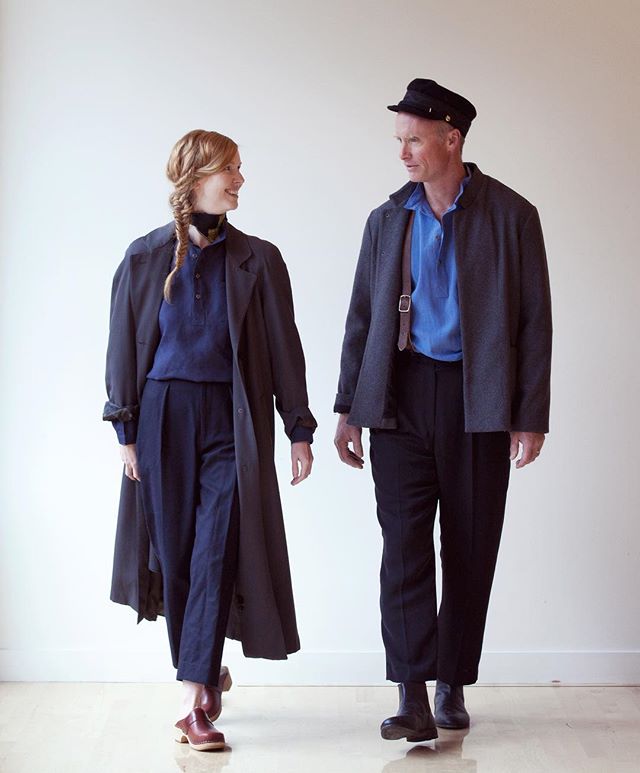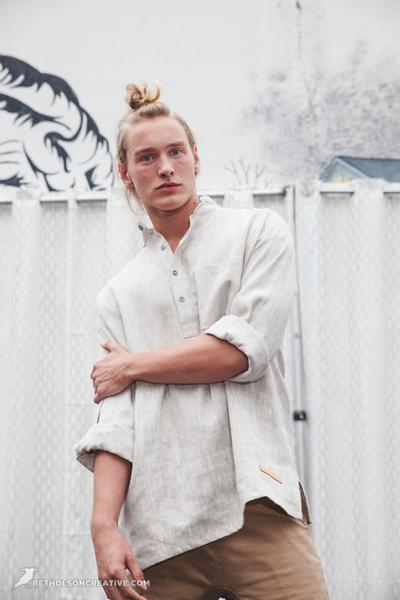Every so often life throws you those serendipitous moments, when a reader of your blog connects with a Norwegian across the United States, mentions you and suggests reaching out. That woman does, and you end up getting to know a wonderful, budding entrepreneur and fellow Norwegian you otherwise wouldn’t have come across.
That is exactly what happened just a few short months ago. I believe nothing is a coincidence. People come in to your life for a reason, as much as they leave your life the same way. The person I connected with is Ingvill Kaasin Montgomery, founder of the super interesting company and online clothing shop, Hovden Formal Farm Wear, who happens to share my interest and love for Norwegian history and traditions.
Ingvill told me she was inspired to bring back old the Norwegian work shirt from 150 years ago worn by farmers and workers, called “busseruller” in our language (“arbetsskjorta” in Swedish and Danish), and decided to start her own company after she moved from Norway to the United States.
What on earth is a busserull? It’s a traditional, every day light shirt or cardigan that was worn in the 1800s by men, particularly when working outside. It is made from square pieces in the back and front with wide arms, and has either buttons or a string tie in the neck. The name stems from the Italian and low German ‘busserun’, which means seaman’s shirt, and the French ‘bougeron’ (work blouse).
Don’t think you have to be a farmer or do manual labor to wear busseruller. These beautiful, classic creations have a versatile usage, and are worn to parties, everywhere in daily life and even weddings! Just don’t ever think about wearing it to church…
While a busserull looks like a shirt, it’s typically worn as a heavier layer on top of a lighter shirt. The busserull made a comback in the 1960s when the academic crowd started wearing the shirts, perhaps because they saw it as a traditional piece of clothing for the labor force.
(Images below are from Hovden Formal Farm Wear’s website):


A native Norwegian now located in Portland, Oregon since 2008 – Ingvill started making busseruller in 2014 and works with a local designer to create these historical shirts, focusing on using sustainable and ethical production methods made from quality pieces. She consciously chooses not to resort to cheap labor in Asia, but rather 80% of her clothes are produced by a small company located in Pamplona, Spain consisting of 8 ladies who specializes in sewing traditional, European clothing (among other things, traditional Basque garments). Her goal is to keep all production as local as possible, and part of her plan is to move the American production to Portland, OR where she resides.
Ingvill originally got the idea to produce busseruller when working in the wine industry in Oregon, witnessing winemakers, who are essentially farmers, having to attend wine dinners, tastings and presentations in the city . They didn’t feel comfortable wearing suits, and the look also didn’t represent them as wine producers. So Ingvill thought: busseruller would be perfect! Elegant looking yet comfortable to wear – a win win!

Because Ingvill’s company is so dedicated to ethical manufacturing, social and environmental standards, she is committed to raising consciousness of the price we have to pay for mass produced, cheap clothing. Instead, Hovden Formal Farm Wear insists on making quality clothing and pieces that are long lasting; an ode to vikings who didn’t have much, but were meticulous in taking good care of their clothes so they could last a life time. I just love this about the company!
The original busserull look (Photo Credit: Paul Stang, Fylkesarkivet):

Hovden’s website reads: “One of the reasons the shirt is so unique is the way the pattern was designed. Because fabric was a scarce commodity 150 years ago, the shirt was made up of squares and rectangular pieces, which resulted in almost no fabric going to waste. The proportions were drafted in such a way that fit the 3-dimensional body with ease and comfort. We have replicated this pattern.”
This is an important part of the makings of the busserull shirt, based on how Norwegians used to live in the old days where every single thing is utilized, and nothing is discarded. I’ve repeatedly written about this concept on the blog, as it relates to food history in Norway, where using leftovers regularly and creatively was an important part of our tradition. I believe we can all benefit greatly from being reminded of the importance of appreciating the value of ingredients and things we surround ourselves with.
While the busserull was originally a man’s shirt, today it’s gender neutral. Women’s work clothes back then were aprons.
I was lucky enough to receive a beautiful apron Ingvill made, which you see me wearing in the main picture in this blog piece. I love how comfortable and versatile it is, but the best part of this apron for me, is that I feel it brings me home to my ancestors and family in Norway. My grandparents on both sides were farmers and fishermen, much like a lot of Norwegians back from a hundred plus years ago. They were humble, hardworking people who appreciated and cleverly used local resources available to them, and not to mention: amazing cooks! I can envision both my grandmothers, Sarah and Karoline, in an apron such as this, hard at work in the kitchen baking lefser, flatbrød and soups and stews from root vegetables grown on their farm.

Wearing the apron inspired me to get in the kitchen immediately to bake a special kind of bread from my region of north-western Norway, which I will share with you in part 2 of this blog series tomorrow!
You can read more details about Hovden Formal Farm Wear’s gorgeous apron and purchase it HERE.
As a female career and empowerment coach, I love meeting other women who are in business for themselves. It’s extra fun when these women are Norwegian and expats like myself, on a mission to improve the world and raise consciousness of how we live our lives!
I look forward to working with Hovden Formal Farm Wear in the months and years to come, to promote and support Norwegian businesses, history and traditions in the United States.
Hovden Formal Farm Wear has an online store and can ship shirts all over the world. You can find Ingvill at http://hovdenformalfarmwear.com. Also check out their FB page and Instagram account.
Email ho*******@***il.com.
Reviving the busserull; an old Norwegian work shirt, plus an apron that inspired me to bake

SEARCH
Browse by Category
Baked Goods & Desserts
Breakfast
Culture & History
Drinks
Main Dishes
Wine


0 Comments
Trackbacks/Pingbacks